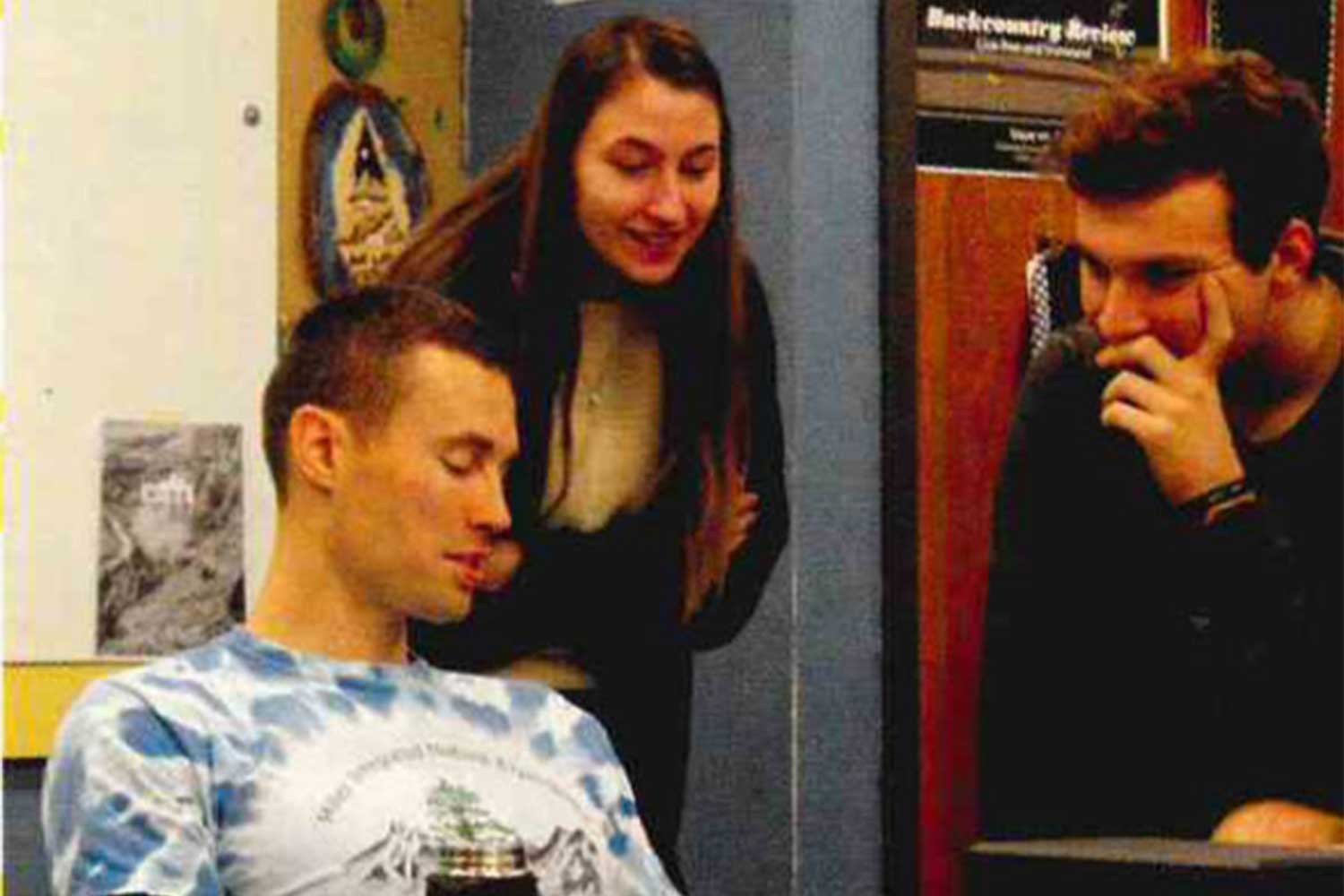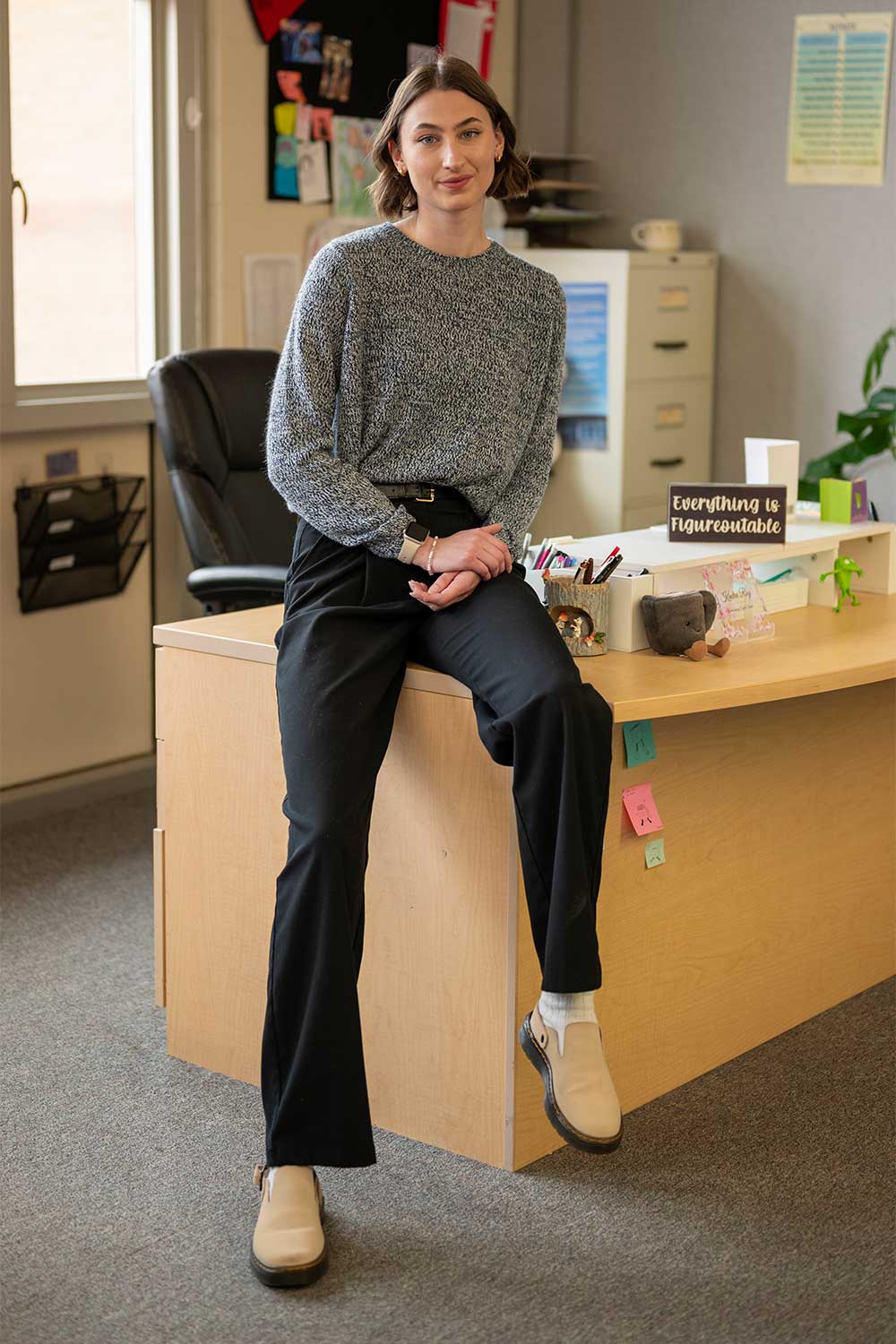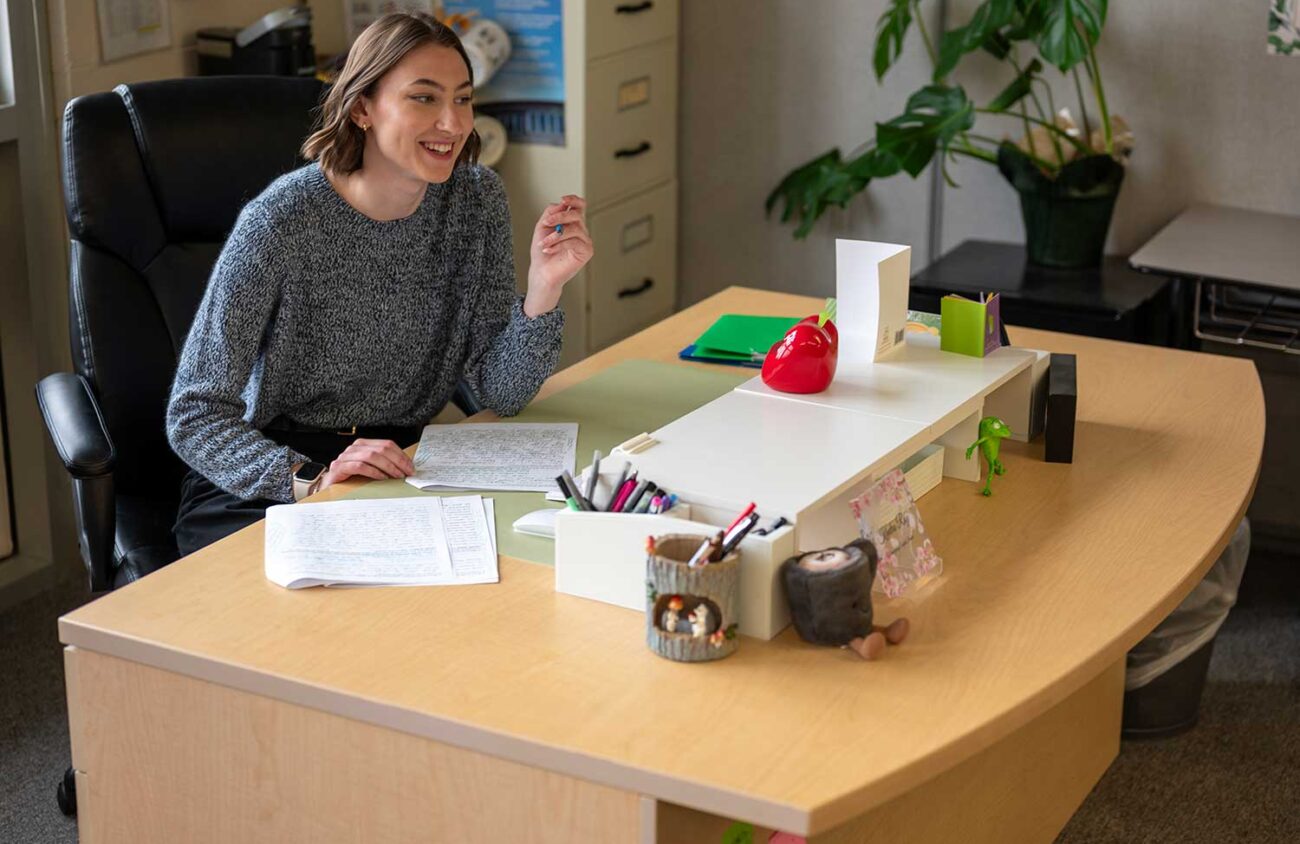On Kindra Roy’s desk in her classroom at Cottage Grove High School, there’s a sign: “Everything is figureoutable.” Even though “figureoutable” isn’t technically a word, for this English teacher, “figureoutable” and Roy’s practice of it have been a theme throughout her life.
Described by Cottage Grove High assistant principal Chris Wells as a “warm demander,” someone who has high expectations but will help her students reach them, Roy is in her element in the classroom and has already become a lauded teacher at the school by her co-workers and the school’s administration.
It’d be easy to imagine that this competent and easygoing woman, aiding her pupils in developing analytical and communication skills, has had a picture-perfect life.
But this Cottage Grove High teacher endured more challenges during her adolescent years than many could imagine. She grew up with a lack of financial stability and a parent with mental health issues. But she had many rooting for her to overcome such obstacles. Now she’s able to relate to many of her students’ challenges and be their champion.
Spending her earliest years on a bucolic 50 acres in Cottage Grove, Roy and her siblings enjoyed a childhood of exploring nature. Family hikes, picnics and playing at a creek are some of her earliest memories.
But a life of picking fruit and playing with neighboring children began to unravel when her father, a man who loved poetry and the outdoors, started to become distant and aggressive, nothing at all like the beaming personality he once possessed. Her father had developed schizophrenia.
Roy grew to fear her father, who was engulfed in confusion and anger. She felt guilt over dreading time spent with him, causing her to feel as if she were abandoning him.
Her father’s illness nearly capsized the family. Money became scarce, and Kindra’s mother, Julie Roy, became the sole provider. She had to work multiple jobs. “Most of the memories that I have are watching my mom try to support all of us,” Kindra says.
“I really attribute basically everything I have now to my mom during that time, because she had a thousand and one things to be worrying about, and she somehow made it happen for us,” she says
Medical debt accrued, with some of her father’s medications costing $600 out of pocket monthly for two years, according to Kindra.
Things worsened, and the Roys were forced to vacate their rental home in 2018 when she was in high school.
With no place of their own, Roy resorted to couchsurfing, often coordinating with friends throughout the day to figure out where she’d stay that night. The family often was forced to split up, staying in different locations.
Roy and her mother stayed at a friend’s house and slept in a cramped upstairs bedroom that had been used for storage. She began to notice bites all across her body. Eventually, she realized her mattress was infested with bedbugs.
“I would sleep in a hoodie and sweatpants and tuck my sweats into my socks and just kind of try to cover as much of my body as I could, kind of wrap myself in the blankets,” Roy says.

She grew up in Springfield and attended Springfield High. Her teacher, Ivan Miller, noticed something wasn’t right with Roy, who had always been a stellar student.
After class one day, Miller asked if she was all right. Roy began to cry, telling Miller all she was dealing with.
“It was just devastating to have to see this wonderful kid go through such a troubling time,” Miller says. “Here’s this really wonderful young person who has the brightest future ahead of her, and then her world sort of crumbles and falls on top of her.”
Roy appreciates the support Miller showed her. “He was one of those people pushing me like, ‘No, you’re still doing this. You’re still going to college. You’re applying to those scholarships.’ And he really pushed me to keep going through that time, which everyone needs.”
Despite having a strong support system in the form of her mother, friends, Miller and other teachers, Roy needed a chance to break away from the toll her circumstances put upon her.
Roy’s respite came in the form of trips to the coast led by Miller for Springfield High’s Miller Integrated Nature Experience (MINE, named for Springfield’s mascot, the Millers).
“I really believe in the value of sharing wild places with people,” says Andy Blair, an assistant director with NOLS (National Outdoor Leadership School) Rocky Mountain division, who began working with the school as a field instructor in 1992. NOLS was one of the inspirations that led to the formation of MINE, which was active until Miller left to teach at the University of Oregon in 2024.
Cautioning that the demands of wilderness training, like the courses offered through NOLS, can compound someone’s stresses, he believes “a few hours outside can have such a beneficial impact on, you know, a person’s mental and physical health and the relationship they have with other people.”
During the trip, the students would journal and share what they wrote with the group. It was then that Roy opened up about the challenges she and her family faced. “It really puts things into perspective, like all these people are cheering for me. I have a space away from the stressors that are going on in my life,” Roy says.
“It was sort of magical,” Miller says of the way his students opened up to one another.
Roy is grateful to have been distanced from her stressors and feels it might have saved her from serious problems later in life. According to Dr. Maureen Zalewski, a clinical psychologist and professor at the University of Oregon who focuses on how parental mental health affects children, having a parent with mental health issues increases the likelihood that their child could also develop mental health issues, though she wants people to know it’s not deterministic.
Zalewski says one in 10 children lives in a home with a parent with mental health issues. “A lot more kids than you realize have backgrounds where their parents are really struggling with mental health concerns,” she says. “So you are actually going to end up with a lot of stories where kids go on to lead really resilient and successful careers, lives, have their own families, even with a parent who struggles, because it is far more prevalent than I think people recognize.”
Despite the challenges she faced, Roy was the salutatorian of her class and received enough scholarships to cover all of her tuition at Pacific University, where she graduated with a 4.0 GPA and received a degree in English education.
Last year was her first year teaching at Cottage Grove High School. Wells, who was interim principal at the time, says he was astounded by her teaching proficiency — her skills belying the fact that it was still early in her career. Her attention to detail and data-driven approach to education even earned her an invitation to a Professional Learning Communities (PLC) at Work Institute conference, where teachers network with some of the most insightful minds in education.

“I’m trying to think of other professions where you’re interacting with 175 developing minds on a weekly basis,” Roy says of teaching. She hopes that by sharing her story, her students, who may be going through their own difficulties, will see that their teacher made it through tough times.
Roy also wants there to be a greater understanding of the challenges that families affected by mental health challenges face. “We just have to find a better way to support them [people with mental health issues], because it’s falling on the families, and the families don’t have the tools that they need,” she says.
For Miller, he couldn’t be prouder of his former student. “Kindra is a story of triumph, just a great human being who will truly make a difference in the world,” he says.
Roy has weathered much in her life, but now she’s able to be an adult who cares for others who are facing their own challenges. “If I can be that person for someone who is just, ‘You’re going to be fine, you’re going to be better than fine. We’re going to get you to where you want to go. We’re not going to just start scratching off dreams because of whatever’s going on in your life, we’re going to make that happen,’” Roy says of her goal to uplift her students.
In Roy’s classroom, it’s common to see students spending time there during lunch and after class — something Wells has taken notice of. “Kids want to be around a really consistent, kind adult who pushes them to be better. And she’s doing that with the students,” he says.
In his two decades in education, Wells has learned about students’ unstable living situations, whether while a student was attending school or learning about a student’s struggles later on, sometimes years after graduation. According to the U.S. Census Bureau, Cottage Grove has a poverty rate of 14.3 percent, while the national average is 11.1 percent.
Where students face an array of adversity, he believes it’s essential that they have teachers who understand their situations. As he says, “We have kids who are couch-hopping on different couches every night, but they may not look like it.”
When Wells met Roy, he says he was impressed by her approach to education and knew he wanted to hire her. But he didn’t know that Roy’s teen years — like some students who attend Cottage Grove High School — also included resorting to couchsurfing despite having a veneer that suggested otherwise.
Just as Miller noticed one day that Roy was struggling, she, too, notices when a student may be struggling. If Roy, an avid letter writer, thinks a student might not be OK, she’ll write a note, letting the student know she’s thinking of them and cares about what’s happening in their lives. She keeps a bundle of cards nearby. “That’s kind of what I’ve been focused on, just trying to find those little moments and let students know I’m thinking about them.”
Roy knows from her own experience how essential it is to have people who care.
“I did have an abundance of support. I had a lot of really close friends. I had my mom, who was a big supporter. I had teachers who were supportive. And so I think that was the number one thing,” she says. “I had people kind of rallying around me and pushing me to overcome.”
